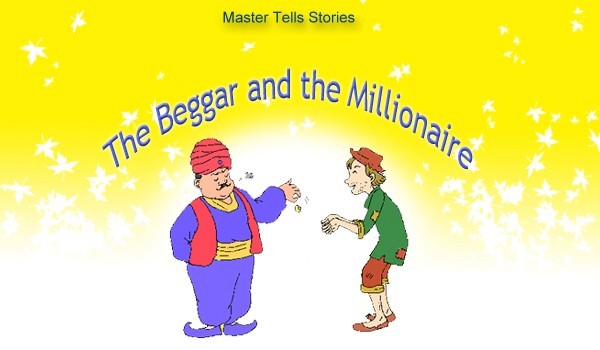
Spoken
by Supreme Master Ching Hai, Seven-day Retreat, Taipei, Formosa,
May 23, 1994 (originally in English) Videotape No. 428
There once was a beggar, and in his home town there lived a millionaire. But that person was very, very stingy! So everything he had, he stuck somewhere in a cupboard or dug a hole in the earth and hid. No one, not even he (laughter), knew where it was. In this way, he didn’t have to spend!
So he was very, very stingy! He never gave anyone a penny, not to mention refugees or the Red Cross; he didn’t even want to hear about such things. He wanted to keep his money intact. As for spending in the home, he was also very, very expert in stinginess. So his wife, his children, his mother, his brother, his sister — everyone — was miserable.Then one day a beggar came to the millionaire’s door and wanted a piece of gold from him. The millionaire had a lot of gold, but of course, he kicked the beggar out and also told his workers and family to throw him out.
The next day, however, the beggar came back again and wanted the same thing, a piece of gold. So the millionaire once again kicked him out. But the beggar came back again yet another day — and again and again, day after day, month after month, year after year. He really practiced patience!(Laughter) He must have meditated or something because he was so persistent. Patient endurance is one of the virtues the Buddha taught his disciples, one of the Six Perfections.Year after year it went on like this until one day the millionaire was so fed up with the beggar that he finally cut a piece of gold, a very small one, and gave it to him. (Master comments that we should learn from this story: Whatever we want to do, we should persist in, and maybe we’ll succeed!) (Laughter)
Then the beggar became very, very happy. He jumped around and sang “Hallelujah!” And then he took the piece of gold to his bosom and went back to his place and went to sleep. He put his piece of gold next to him, on top of his meditation cushion, and went to sleep.
But when he woke up, it wasn’t there anymore. (Laughter) Of course! Maybe another initiate had thought it was a play toy and brought it home with him or he left it alone and someone else took it, but he didn’t know who. Because the beggar just slept anywhere: in front of the supermarket, under a bridge, in front of the theater, in an empty field, anywhere! So if he put his piece of gold there, people could just take it away. Then the next day he went back and requested another piece of gold from the millionaire.
And the millionaire asked, “But why? I just gave you one yesterday. What did you do with it?” So the man said, “Yes, yesterday I had it. I put it beside me, and I just closed my eyes, and when I opened my eyes, it was gone. So today I have to come back again for another piece.”
When the millionaire heard this, he immediately became enlightened! (Laughter) He realized the truth about the things of this world: Today you have them; tomorrow you don’t. Or you might have them now, but later you don’t. He suddenly somehow became enlightened about the detachment that we should have concerning all possessions in this world.
And after that, he changed his behavior. He began to give in charity to people and to live a very normal, relaxed life. He didn’t cling to gold or money anymore. So the people around him thought that the beggar was a Heavenly being who had transformed himself into a human in order to teach the millionaire the lesson of detachment, and maybe enlightenment. (Applause)
This book (Master holds up the book She has been reading from) is really my benefactor, my teacher. After I read this book, I also became enlightened; I also became very detached. I don’t think about money and gold anymore because I don’t have any! (Master and everyone laugh. The audience applauds.)
I wasn’t born with any gold, and I won’t go out with any gold. Whatever I have is yours. It belongs to the world. Just like you take it from here and give it there. It’s the same with every one of us. We take water from the river, put it in a water tank, and then the water tank distributes it to the whole village or town.
We should live our lives just like a water tank. Whatever we have is for distribution. We’re only the receivers. For example, I have a lot of money, but I never consider myself as having any. It’s very relaxing. You don’t worry because you already don’t consider that it’s yours. So whether it’s there or not, it doesn’t matter.